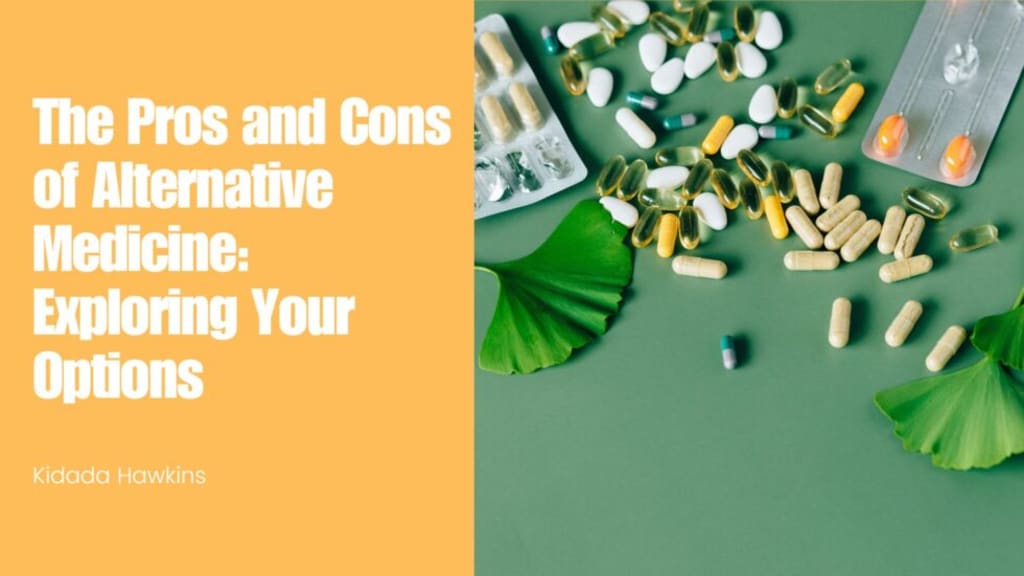Kidada Hawkins on the Pros and Cons of Alternative Medicine: Exploring Your Options | Auburndale, Florida
Kidada Hawkins on the Pros and Cons of Alternative Medicine

Alternative medicine refers to a wide range of non-traditional approaches to healthcare and wellness. These approaches include acupuncture, herbal remedies, chiropractic care, and meditation. While some people swear by these methods, others are skeptical of their effectiveness and safety. In this blog post, we’ll explore the pros and cons of alternative medicine to help you make an informed decision about your healthcare options.
Pros of Alternative Medicine:
Holistic Approach to Health
One of the main benefits of alternative medicine is its focus on the whole person rather than just the symptoms of a specific illness or condition. Alternative medicine practitioners often take a holistic approach to health, considering factors such as diet, lifestyle, emotional well-being, and physical symptoms.
Natural Remedies
Many alternative medicine practices rely on natural remedies, such as herbs, supplements, and essential oils. This can appeal to people who prefer natural or organic approaches to healthcare or are concerned about the potential side effects of pharmaceuticals.
Personalized Care
Alternative medicine practitioners often provide more personalized care than traditional healthcare providers. They may spend more time with patients, ask more detailed questions, and develop individualized treatment plans based on each person’s unique needs and preferences.
Complementary to Traditional Medicine
Alternative medicine can complement traditional medicine, used with conventional treatments to enhance their effectiveness or reduce side effects. For example, acupuncture may manage pain in cancer patients undergoing chemotherapy.
Symptom Relief
Another benefit of alternative medicine is that it can provide relief from symptoms that traditional medicine has failed to address. Many people turn to alternative medicine as a last resort after experiencing chronic pain, fatigue, or other symptoms that have not been adequately treated with conventional medicine.
Patient Control
Additionally, alternative medicine can empower patients to take control of their health and well-being. By focusing on prevention and self-care, alternative medicine practices can help individuals develop healthy habits and lifestyle choices that promote wellness and reduce the risk of illness or disease.
Cons of Alternative Medicine:
Lack of Scientific Evidence
One of the main criticisms of alternative medicine is the need for more scientific evidence to support its effectiveness. While some practices, such as acupuncture, have shown promise in clinical studies, others have not been rigorously tested or may need more evidence to support their use.
Potential Safety Risks
Some alternative medicine practices can have potential safety risks, especially if administered improperly. For example, herbal remedies can interact with prescription medications, and chiropractic adjustments can cause spinal cord injuries if not performed correctly.
Lack of Regulation
Alternative medicine is regulated differently than traditional medicine, making it challenging to ensure the safety and quality of products and services. Some alternative medicine practitioners may make false or misleading claims about their treatments or credentials, which can put patients at risk.
Delayed or Ineffective Treatment
Relying solely on alternative medicine to treat a severe illness or condition can delay or prevent effective treatment. It’s essential to consult with a healthcare provider and consider all treatment options before deciding on your healthcare.
Alternative medicine can offer a range of benefits, including a holistic approach to health, natural remedies, personalized care, and complementary treatment options. Despite these benefits, it’s essential to approach alternative medicine with caution and skepticism. Some practices may have limited scientific evidence to support their use, and others may be outright scams or dangerous. It’s crucial to research alternative medicine options thoroughly and consult with a healthcare provider before beginning any treatment regimen. Patients ought to be aware of the potential risks and drawbacks, such as lack of scientific evidence, potential safety risks, lack of regulation, and delayed or ineffective treatment. Consult with a healthcare provider and research before exploring alternative medicine options to ensure that you are making informed decisions about your healthcare.
About the Creator
Kidada Hawkins
Based in Auburndale, FL, Kidada Hawkins is a community-minded professional who works in healthcare administration and management.






Comments (1)
Interesting. Thank you for sharing.